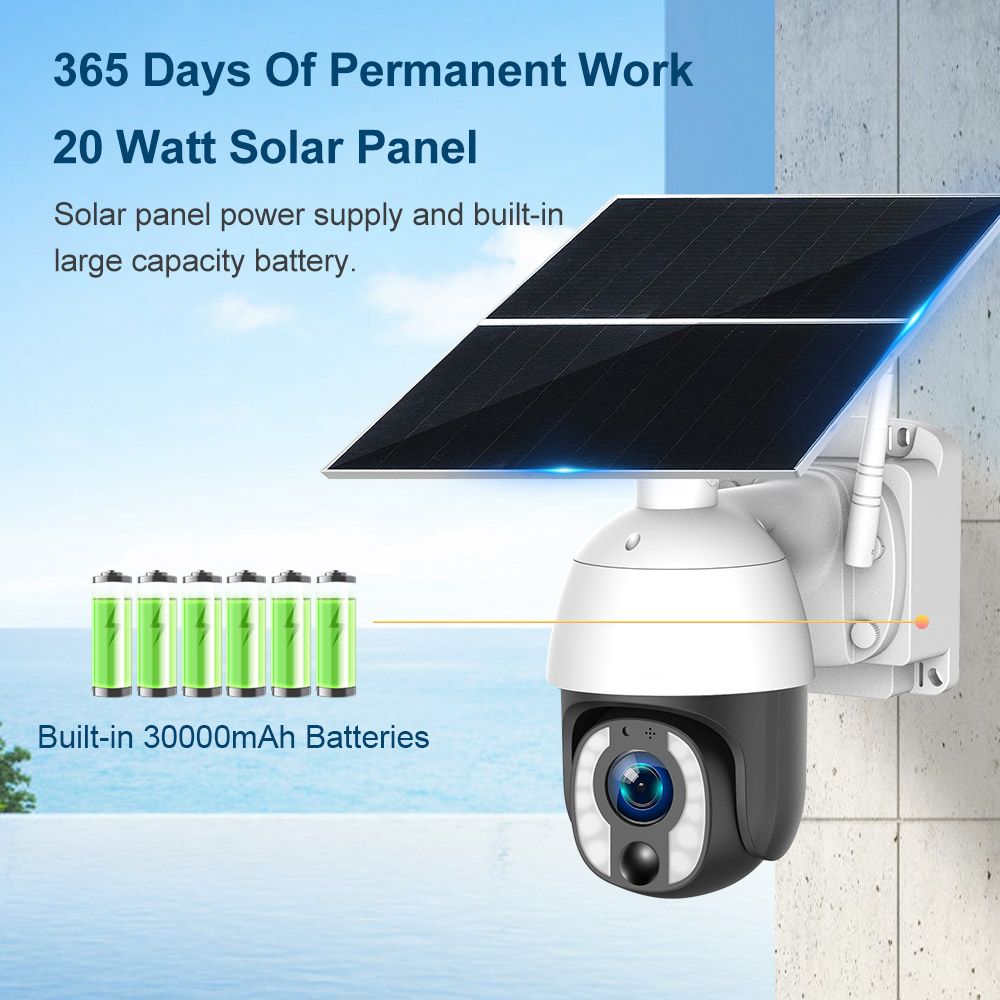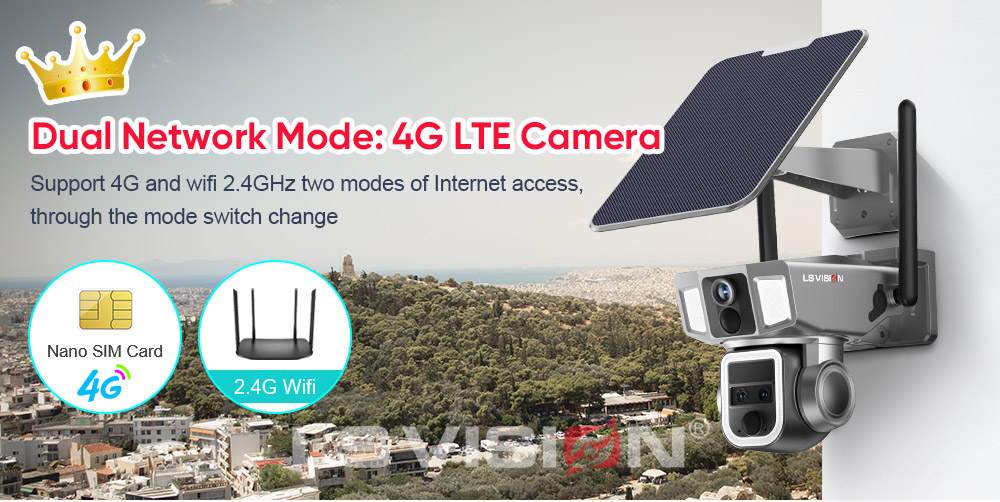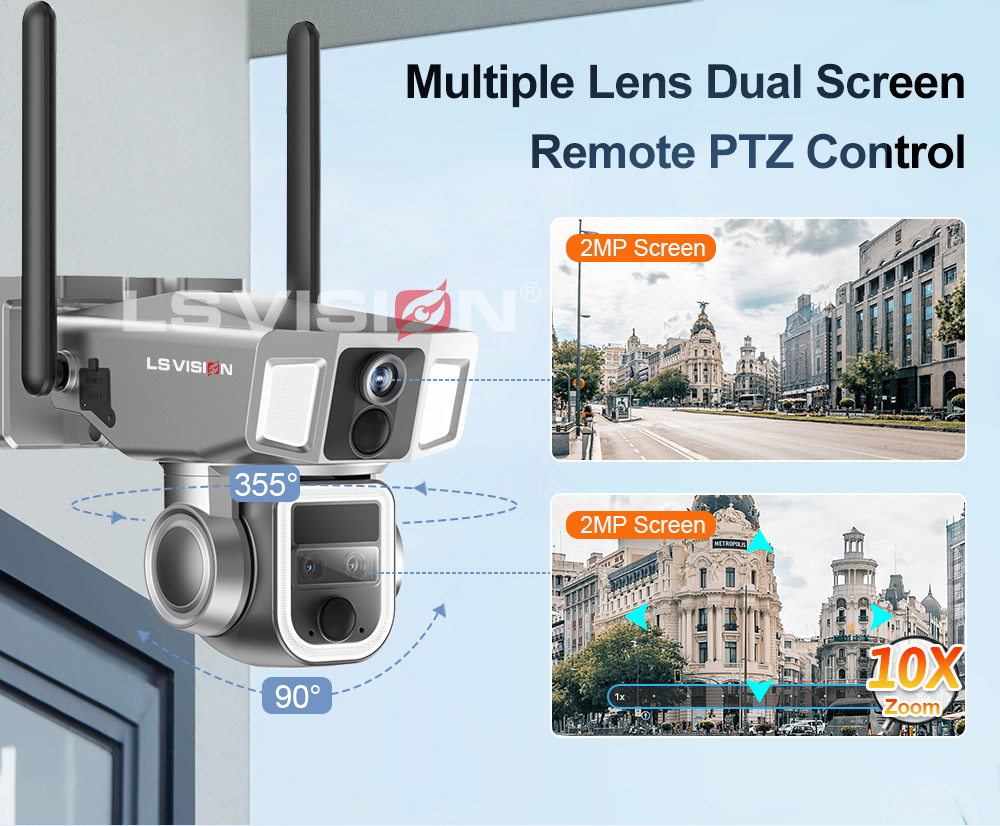Table des matières
ToggleThe market for solar-powered cameras, including solar-powered video cameras, off-grid security cameras, and 4G solar CCTV cameras, is rapidly growing in response to increasing demand for sustainable and energy-efficient security solutions. With technological advancements and the global shift towards renewable energy, solar cameras are becoming indispensable tools for both residential and commercial sectors.
However, while the prospects for solar cameras appear promising, the market faces several challenges related to technology maturity, cost control, and user acceptance. This article explores the current status, future development trends, and the challenges impacting the solar camera market, along with the emerging opportunities for brands like LS VISION.
Current Status of the Solar Camera Market
The global solar powered video camera market is gaining significant traction, driven by the increasing need for environmentally friendly security solutions. As of 2024, the solar-powered camera market is valued at several billion dollars, and it is projected to grow at a compound annual growth rate (CAGR) of 11.3% from 2024 to 2031. The rapid expansion of this market is fueled by several factors:
- Rising Demand for Sustainable Solutions: As more businesses and individuals become environmentally conscious, the demand for energy-efficient solutions grows. Solar cameras, which run entirely on solar energy, offer a greener alternative to traditional security systems that rely on grid power.
- Technological Advancements: Innovations in solar technology have led to the development of off grid security cameras that can operate independently of the electrical grid. These cameras use high-efficiency solar panels to power the cameras even in remote locations, where traditional power sources are unavailable or unreliable.
- Cost-Effectiveness and Convenience: Solar cameras, particularly 4G solar CCTV cameras, are not only energy-efficient but also cost-effective over time. By eliminating the need for electricity bills and reducing the cost of installation in areas without access to a power grid, solar cameras are becoming an attractive choice for both consumers and businesses.
Key Market Segments
The solar camera market can be segmented based on application, camera type, and geographical region. Notable segments include:
- Remote Monitoring: This segment involves the use of solar cameras for surveillance in remote or off-grid locations. Industries such as agriculture, forestry, and construction rely heavily on solar cameras for monitoring and security.
- Construction Site Surveillance: With the growing demand for construction safety, solar powered video cameras are increasingly used for surveillance in construction zones. These cameras help ensure that safety standards are met while providing remote access to project managers and stakeholders.
- Fixed vs. PTZ Cameras: Fixed cameras are the most common type used in security, providing consistent coverage in stationary locations. On the other hand, Pan-Tilt-Zoom (PTZ) cameras offer enhanced flexibility and advanced functionality, allowing users to remotely control the camera’s direction and zoom to capture specific areas of interest. The integration of solar technology into these cameras makes them even more versatile, especially in locations without a reliable power source.
- Geographical Insights: North America, Europe, and the Asia-Pacific region are the leading markets for solar cameras. While North America benefits from advanced technological infrastructure and strong consumer demand, Europe’s stringent environmental regulations and a focus on renewable energy make it a key market for solar-powered video cameras. In the Asia-Pacific region, countries like China and India are seeing rapid growth in solar camera adoption due to government incentives and a large, untapped market.
Future Development Trends in the Solar Camera Market
As the demand for solar powered video cameras continues to grow, the future of this market looks promising. Several trends are shaping the evolution of solar camera technology:
1. Integration with IoT and Smart Technologies
One of the most significant trends in the solar camera market is the integration of solar powered video cameras with Internet of Things (IoT) technology. This integration allows users to remotely monitor and control their solar cameras through smartphones, tablets, and computers. The use of smart technologies, including AI for facial recognition and motion detection, enhances the security and functionality of solar cameras.
For example, a 4G solar CCTV camera integrated with AI technology can detect motion, send alerts to the user, and even identify specific objects or people in the camera’s range. This level of sophistication adds value to solar cameras, making them more appealing for both residential and commercial applications.

2. Miniaturization and Increased Efficiency
Another key trend is the miniaturization of solar cameras. Advances in solar panel technology are allowing manufacturers to produce smaller, more efficient cameras that maintain high levels of performance. These cameras are lightweight, easy to install, and capable of operating in a variety of environments. Miniaturization is particularly beneficial for applications in areas where space is limited, such as urban environments or construction sites.
As efficiency improves, off-grid security cameras will be able to function in more challenging conditions, providing reliable security in regions with less sunlight or harsher climates.
3. Battery Life and Storage Solutions
Improving the battery life of solar cameras is another crucial area of development. For cameras installed in remote locations or areas with inconsistent sunlight, reliable energy storage is essential. Advanced lithium-ion and other battery technologies are being developed to store excess solar energy during the day, ensuring that solar powered video cameras continue to operate through the night or during cloudy days.
In the future, solar camera systems may include cloud storage options that automatically back up footage, reducing the risk of data loss. This will be particularly important for industries that rely on long-term surveillance, such as construction and agriculture.

4. Hybrid Solar Systems
Hybrid solar camera systems that combine solar energy with backup battery or grid power are becoming more common. These systems offer greater flexibility and reliability, especially in areas where sunlight is inconsistent. For example, a 4G solar CCTV camera could switch to grid power in cases of low sunlight or inclement weather, ensuring uninterrupted operation.
Challenges Facing the Solar Camera Market
Despite its potential, the solar camera market faces several challenges that may hinder its growth:
Technology Maturity
While solar camera technology has improved significantly over the past decade, it is still evolving. One of the major challenges is the need for continuous innovation in solar panel efficiency and energy storage solutions. In regions with lower sunlight exposure, the efficiency of solar panels may be insufficient to support high-resolution cameras or long-term surveillance without relying on additional power sources.
Cost Control
Although solar powered video cameras offer long-term savings, the initial cost of these systems can be a barrier for some consumers. The price of high-quality off-grid security cameras with advanced features such as PTZ functionality or 4G connectivity can be prohibitive for individuals or small businesses. Reducing the cost of production, improving manufacturing processes, and offering more affordable models will be key to increasing adoption.
User Acceptance
User acceptance remains one of the most significant challenges for the solar camera market. Many potential customers may be skeptical about the reliability of solar cameras, particularly in regions with unreliable sunlight. Additionally, some users may prefer traditional, wired security systems due to concerns about performance or installation complexity.
Education and consumer awareness campaigns can help address these concerns. Companies like LS VISION can play a pivotal role in educating the market about the reliability, cost savings, and environmental benefits of solar cameras.
Regulatory Hurdles
In some regions, regulations related to solar panel installation and the use of surveillance equipment can complicate the adoption of solar-powered cameras. Companies looking to expand in international markets must navigate these regulatory landscapes carefully, ensuring compliance with local laws regarding surveillance and renewable energy technologies.
Opportunities for LS VISION Solar Camera Company
LS VISION, as a leading brand in the solar camera market, is uniquely positioned to capitalize on the growing demand for sustainable and energy-efficient surveillance solutions. By focusing on innovation, cost control, and user education, LS VISION can overcome the challenges facing the market and maintain a competitive edge.
Product Innovation
LS VISION should continue to invest in product innovation, particularly in areas like AI integration, hybrid power systems, and enhanced battery storage. By offering 4G solar CCTV cameras with advanced features like facial recognition or motion detection, LS VISION can attract a wider customer base, from residential users to large-scale commercial enterprises.
Education and Consumer Engagement
LS VISION can increase its market share by launching educational campaigns that highlight the benefits of off grid security cameras and solar powered video cameras. Showcasing real-world case studies, emphasizing energy savings, and demonstrating the reliability of solar technology will help build consumer trust and encourage adoption.
Strategic Partnerships
Forming strategic partnerships with environmental organizations, governments, and construction companies can help LS VISION tap into emerging markets and expand its reach. By promoting sustainability and energy efficiency, LS VISION can position itself as a leader in the eco-conscious surveillance space.
Looking Ahead: Growth Opportunities in the Solar Camera Market
The future of the solar camera market is bright, with continued growth expected across various segments. Companies like LS VISION have a significant opportunity to lead the charge by innovating, educating the market, and forming strategic partnerships. As technology improves and consumer demand for sustainable security solutions rises, the market for solar powered video cameras will continue to expand.

Are you ready to explore the potential of solar-powered surveillance systems? With 4G solar CCTV cameras, off grid security cameras, and solar powered video cameras, LS VISION offers cutting-edge solutions for your surveillance needs. Are you ready to explore the potential of solar-powered surveillance systems? For more information, contact us via email at Jennylee@lishigroup.com or by phone at +86 13662574726.


